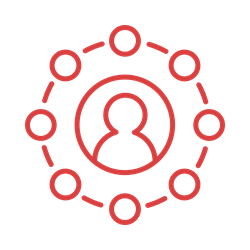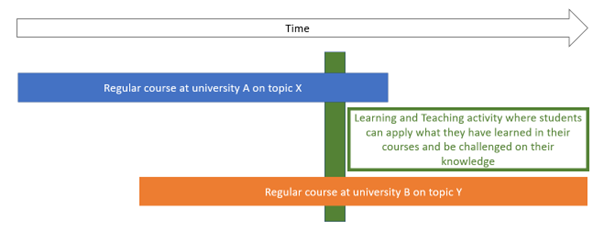EPI-WIKI
Tabs
Fostering an LAS Philosophy

In what ways can LAS didactic principles enhance teaching non-LAS courses and study programs?
The learning and teaching environment in university study programs can be impacted by several factors. Some examples:
- university organizational structure,
- faculty attributes and mission,
- and embedded, well-worn pedagogical practices
Integrating an LAS philosophy in study programs means fostering an intensive, interactive, and collaborative working environment among students and instructors, targeting knowledge exchange, individual development and interdisciplinarity wherever and whenever possible.
Since the factors influencing such an atmosphere are manifold, there are multiple measures that can bring a department or faculty towards LAS pedagogical practices.
Liberal Arts and Sciences inspired courses are very often competence-oriented and have a variety of targeted competences. Besides such key competences different competence sets have developed, in particular targeting Education for Sustainable Development (e.g., Wilhelm et al. (2019) or UNESCO (2017))
The increasing focus on competences in teaching reflects a growing interest in the impact of education. To implement a competence orientation in course design, teachers often use the principle of Constructive Alignment. It remains a challenge to choose what competences are aligned with one's educational objectives. The operationalization in teaching may not be straightforward, especially because learning outcomes must be verifiable.
Under Developing competences a needed shift of mindset is described. Wilhelm et al. (2019) describe the operationalization of coherent teaching and learning on the example of competences for Sustainable Development.
cf. How to Design Co-Construction and Collaboration in Learning & Teaching
To support a learning environment that embraces LAS-inspired/informed educational approaches (e.g., fostering critical thinking, lifelong-learning, collaboration), it is vital to create a space that allows educators to exchange and explore ideas and to discuss these. In this way a Community of Practice for education could develop with inventive teachers becoming multipliers. Furthermore, a new standard in higher education can be set, knowledge shared and challenges overcome. Learning from peers rather than from “experts” makes teachers and their supporting staff feel more inclined to attempt new educational approaches on their own and to turn to their peers for help. Fostering a departmental climate that encourages reflection and personal development for both staff and students is essential (De Alencar et al., 2017).
Beyond having a platform for exchange, classroom collaboration can also encourage an LAS mindset. Collaborative teaching practices help Liberal Arts and Sciences expression in many ways: intensifying knowledge exchange, boosting innovation in teaching, and combining different perspectives are just a few benefits. Furthermore, collaboration in teaching increases the likelihood of meeting each student's individual needs (Ferguson & Wilson, 2011). Nevertheless, collaborative teaching within a university study program, let alone across study programs, is often burdened by many constraints:
- few opportunities for discussion and idea exchange with colleagues about teaching strategies
- a large teaching load and other activities (e.g., publication) under a professor’s responsibilities
- limited preparation time for planning teaching (including adjustment by class size and delivery mode)
- insufficient time for contact with students, and
- inadequate resources.
Teaching is often the duty of professors who are obliged to have a certain number of contact hours per week per semester. In some study programs, these contact hours per week per semester are shared among instructors if they decide to co-teach a course. This sharing of contact hours, however, does not reflect the increase in communication need that usually comes with co-teaching.
When integrating collaborative teaching practices into the study program structure, it is important to consider the variety of collaborative teaching practices in higher education. Collaboration in teaching can take place in the design stage, in the delivery stage, or both. Successful co-teaching requires an investment of time and effort (Yanamandram & Noble, 2005). Besides instructor-instructor collaboration, student-instructor collaboration is a crucial aspect in Liberal Arts and Sciences education. Activities that encourage exchange between students and instructors (e.g., creation of meeting centers, debate forums, and student-led, faculty-mentored courses) increase the student-centeredness of study programs and remove barriers that stunt creativity and students’ intrinsic motivation.
Cf. Toolkits for Co-Creative Learning and LAS Teacher Training, Digital Teaching Competences
Integrating LAS methods and didactics could be a step toward disrupting cultures of conformity and knowledge reproduction and fostering a culture without fear of making mistakes. Having sufficiently varied and diverse working situations enables all students to be active and creative. Constructivist approaches to course design support LAS expressions in existing offers. Furthermore, student self-assessment and portfolios are drivers of student empowerment and supporting learner agency (Schoon, 2018).
De Alencar et al. (2017) provide this list for encouraging student agency and creativity in courses:
- Allowing students the freedom to work in new and interesting ways
- Challenging students with real, demanding, and exciting work
- Designing assessment that allows for outcomes that are not narrowly pre-determined.
Shifting from assessments of learning towards assessments as learning is an essential step to empowering students for lifelong learning. Below is a list of typical versus desired assessment practices, the latter commonly applied in Liberal Arts and Sciences didactics.
Shifting teaching practices may be addressed through professional development. Such programs are not equally present at all universities. Integrating competency-based, research-backed, and personalized professional development into the working profile of instructors will increase the value of education in universities and allow instructors to acquire new competencies they can integrate in their teaching.
LAS-derived professional development offers (e.g., the principle of ongoing assessment, problem-based course design, and interdisciplinary teaching/assessment) emphasize student-centered approaches to teaching and learning. Universities can decide to create their own offers or benefit from accessible offers from beyond the university (e.g., in European university alliances like EPICUR).
Instead of integrating single courses or European Tracks into existing and developing study programmes, integrating Learning and Teaching Activities is an attractive way of integrating LAS components. Instructors, e.g., could organize joint undergraduate research projects. For example, in such a project, students study a course in their home university, then compare and contrast their findings and synthesize the key outcomes. This requires close cooperation between the lecturers involved, and the timing and learning outcomes of the related courses must at least partly coincide.
An example of such an integration of LTAs is students from a course on Entrepreneurship meeting up with students from a course on sustainability. In the Entrepreneurship course, students learned about design thinking and entrepreneurship and established their start-up ideas. To get challenged on the sustainability of their business ideas, they meet up with students from a course on sustainability challenges. In this way students from both courses can expand their learning experiences, in the LAS spirit of interdisciplinary, problem-based learning.

Toolkits for Co-Creative Learning and LAS Teacher Training
Related Wiki pages
These Wiki pages might also be interesting for you:
Resources
- Kahn_Anderson, 2019. Developing Your Teaching - Towards Excellence (2nd ed.). Chapter 4 - A partnership with students in learning and teaching.pdf (316.52 KB)
- BovillCook-SatherandFelten2011 Students as co-creators of teaching approaches, course design, and curricula.pdf (196.68 KB)
- Bovill 2019 Co-creation in learning and teaching - the case for a whole-class approach in higher education.pdf (394.80 KB)
- Teaching in Teams - A Planning Guide for Successful Collaborations.pdf (427.65 KB)
- Using a Community of Practice in Higher Education - Understanding the Demographics of Participation and Impact on Teaching.pdf (319.55 KB)
- UNESCO Education for Sustainable Development Goals 2017.pdf (11.68 MB)
- Binkhorst, F., Handelzalts, A., Poortman, C. L., & van Joolingen, W. R. (2015). Understanding teacher design teams - A mixed-methods approach to developing a descriptive framework. Teaching and Teacher Education, 51, 213e224.
- Co-creating curriculum with students
- O'Dowd, R. From telecollaboration to virtual exchange: state-of-the-art and the role of UNICollaboration in moving forward
Back to > DESIGN> How to Design Co-Construction and Collaboration in Learning & Teaching
Last edited: 26. Oct 2022, 12:12, [sr1149@uni-freiburg.de]

